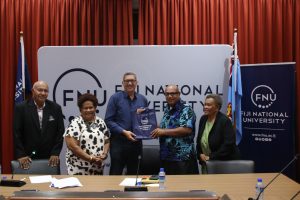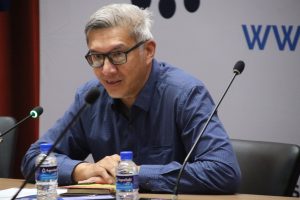

The Fiji National University (FNU) on Friday hosted Senior Project Officer at UNESCO’s Mahatma Gandhi Institute of Education for Peace and Sustainable Development, Mr Abel Caine, for a timely discussion on the impact and opportunities of Artificial Intelligence (AI) in higher education and society.
Mr Caine, a former Fijian government official who helped develop Fiji’s first national IT policy and has since led UNESCO’s communication and information programmes across the Pacific, shared global insights into how AI is reshaping industries, learning, and governance.

In welcoming Mr Caine, FNU Vice-Chancellor Professor Unaisi Nabobo-Baba highlighted the University’s commitment to preparing for an AI-driven future despite financial and structural challenges.
“FNU has been laying the foundations since 2023 to ensure our systems are equipped to respond to the rapid advancements in AI,” Professor Nabobo-Baba said.
“We are mindful that AI presents both opportunities and risks. Our role is to lead responsibly, by developing policies, training staff, reviewing curricula, and ensuring that our students and academics are empowered rather than outpaced by technology.”
She noted that FNU is already in discussion with regional and international partners, including universities such as Melbourne and Johns Hopkins, to develop AI standards and capacity-building programmes.
“By 2027, FNU should be offering qualifications in AI at every level, from certificates through to PhDs. It is important that we, as universities and governments, invest where the world’s struggles and future are heading,” she said.
In his keynote, Mr Caine emphasised that AI was no longer a distant possibility but a transformative reality.
“AI systems today have the capacity of multiple PhDs across every field of human knowledge,” he said. “This poses a profound challenge to traditional teaching methods, but it also offers unprecedented opportunities for innovation in learning, research, and service delivery. The question is not whether AI will impact us—it already is—but how we, as educators, governments, and communities, choose to harness it.”
He also cautioned that the Pacific must be proactive in addressing both the ethical and practical implications of AI, from academic integrity to cybersecurity, employment, and cultural preservation.
The interactive session with FNU staff and students explored the future of pedagogy, the role of universities in AI governance, and how Fiji and the Pacific can position themselves in the rapidly evolving digital landscape.
FNU’s Vice-Chancellor reaffirmed the University’s readiness to lead national and regional conversations on AI.
“FNU must anticipate where the world is heading and prepare our students and staff accordingly,” she said.
“Partnerships such as today’s dialogue with Mr Caine will help us ensure that the Pacific is not left behind, but instead shapes its own AI journey.”